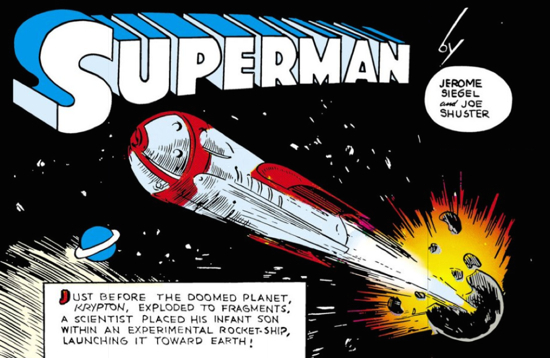What is the Soul of a Superman?
First of all, I am not an
expert on Superman. I’ve read very few of the
thousands of comic books, and have seen only a smattering of episodes of the numerous TV shows in which he has appeared.
I’ve not even screened the third and fourth theatrical films (by choice,
mind you) so my familiarity with all the iterations of
Superman which have come and gone over the decades is minimal.
Still, I believe that I understand the character well enough to proceed
with a passionate plea for his cinematic reclamation.
As a child my first
exposure to Superman was reruns of the black and white television serial “Adventures of
Superman” starring George Reeves. Even though I didn't watch the entire series, I enjoyed what I saw immensely. Yet my interest did not lead me towards other familiar sources such as comic books. With certain
pop culture franchises I have remained a purely visual consumer. I am the same way with Star Wars. While I am aware of the vast range of stories
set in the Star Wars universe that are available in novels and other print media,
I’ve only ever been interested in the movies and the all-encompassing sensory experience that they alone provide.
When “Superman” first came
to theaters in the summer of 1978, I was a boy whose imagination was easily
carried away, and not just by the colossal charm of Christopher Reeve. The rose-colored vision of this character was
equally reflected in the “modern” city of Metropolis. I knew that this was not a realistic depiction of
urban life, for I had watched the nightly
news and knew what happened in big cities. I didn’t question the omission of certain savageries
because I understood that they didn’t fit into the universe which Superman inhabits,
for he is not the only idealized element in this cinematic world.
The real world has changed
very little in the four decades since, but attitudes towards heroes have become
more complex and hyper-critical. Even at the
apex of his popularity in the fifties, Superman was viewed by many as a deluded Boy Scout, unable or unwilling to
acknowledge the seemingly inexpiable failings of so much of humankind. Today the response to Superman’s unfaltering
altruism has metastasized from a bemused intellectual superiority to downright
dismissive scorn. How could he be so
stupid? Why does he even care? What good can he possibly do?
This breaks my heart. The knee-jerk judgments heaped upon Superman
are such an ugly expression of the cynicism which has so virulently infected much
popular culture and online social media.
I understand this up to a point.
There’s a lot to be upset about. Greed,
hatred and tyranny still hold much of our world in a poisonous, debilitating
grasp. Pessimism is so rampant and so accepted that even wishing for things to get better
is often seen as a futile exercise. Furthermore,
even when something good does happen, often the first reactions are smug and
nihilistic assumptions that it was either a fake stunt or merely a momentary
anomaly from the norm of misery.
Shouldn’t that make
Superman and what he stands for even more
relevant and appealing? In a world where
the righteous moral path is shrouded in ever deepening shades of gray, wouldn’t
you want a hero who is the most incorruptible?
Wouldn’t you want someone whom you could implicitly trust to tell you the
truth and always be there to help?
What’s so wrong with actually giving a shit about the world and the
people in it? Has hope now become
something to be viewed as a mental illness?
When did trying to be a good guy suddenly become a bad thing?
I present below a superlative example of how Superman can beatifically merge with our harsher realities when he is in the hands of a writer who understands his character.
I present below a superlative example of how Superman can beatifically merge with our harsher realities when he is in the hands of a writer who understands his character.
Yeah, I needed a tissue too.
Unfortunately, the three most recent films featuring Superman only serve as cautionary tales about the failure to successfully integrate his character into our contemporary global culture. After the titanic two-part saga that unfurls through “Superman” and
“Superman II”, the franchise faltered with the silly “Superman III” and then
augured in with the atrocious “Superman IV: The Quest for Peace.” Rather than try to launch a phoenix from such
ignoble ashes, director Bryan Singer’s solution was to start an
alternate timeline picking up after “Superman II.” It sounded like a fantastic idea, and when the first teaser trailer was released, “Superman Returns” seemed perfectly poised to get the franchise flying high again.
Much to the dismay of many, “Superman Returns” turned out be more like “Superman Mopes.” Other than the superb sequence involving the
rescue of the airplane, Superman’s actions are decidedly un-super, mostly revolving
around pedestrian, soap-opera-styled relationship squabbles. Our hero does almost nothing truly heroic,
and despite the welcome attempt to evoke an earlier era in the Art Deco-styled
production design, the lighting is somber and the atmosphere moody. The whole world looks depressed, and Superman
doesn’t bring any light or joy to the darkness.
There’s SO much wrong with "Man of Steel", but the crowning critical error was the whole-scale destruction of Metropolis that occurs as Superman battles
Zod. Thousands of innocent lives are destroyed
in the toppling skyscrapers and yet Superman never once pauses to help. This total lack of concern for the people whom
he is sworn to protect is a direct contradiction of the core of the
character. Superman would NEVER do this. Zack Snyder’s belated claims that this deviation would be “explained” in future films clearly demonstrates that this
director does not understand the character.
Yet Snyder’s psychological
sketch for both characters is nearly identical.
They brood and glower with furrowed brows, looking in dire need of some
Metamucil. Speaking of coming clean, I
have to confess that I haven’t seen the movie, and I never will. “Man of Steel” was more than enough to
convince me to avoid any future Snyder films because I don’t have enough
ibuprofen and bourbon at home with which to self-medicate afterwards! I have heard enough to know that my decision
was correct. But it still makes me sad.
The one consolation that I
can take from this is that “Batman v Superman: Dawn of Justice” did not do as
well as was hoped. The opening was a
financial bonanza, but the film experienced a second weekend plummet of ticket
sales by almost 70 percent! This is due
not just to the failure to properly present the main characters, but also
because Zack Snyder is such a poor director with no sense of character
development, coherency or pacing. Despite
this precipitous drop in attendance, I doubt it will be enough to convince
Snyder to reconsider his approach to Superman or film-making in general.
What’s worse is that Superman is still in Snyder’s hands, as it has been confirmed that he will direct at least the first of a two-movie Justice League saga. I have no hope that Superman will finally be able to show his true colors again in this next installment. However, I still believe that this character has a place in our lives and could be presented in a modern film in a way that is not corny or anachronistic. It can be done, they just have to find that one director who knows who Superman is, where he comes from and why he does what he does.
Superman is an immigrant,
and his story is a celebration of the ideal of this country being a place for
anyone who wants to remake their lives or just start over. Superman is also an orphan, yet he found a
new home with his foster parents who taught him to value everyone and
everything in equal measure. Superman knows
that the world is usually not fair, but nevertheless he tirelessly struggles to
makes things better because he believes that we have the capability to overcome our flaws and learn to live together peacefully.
Kindled by hope, guided by
the love of his new family and powered by the yellow sun in the bright blue sky
of his new home, Superman carries forward upon his mighty shoulders our fondest
dreams for a better future, and the source of the inspiration for this virtuous
goal is eloquently evoked by his father, Jor-El, in perhaps the single greatest
summation of what Superman represents to us:
“They can be a great people, Kal-El, they wish to be. They only lack the light to show the way. For this reason above all, their capacity for good, I have sent them you. . .my only son.”























No comments:
Post a Comment